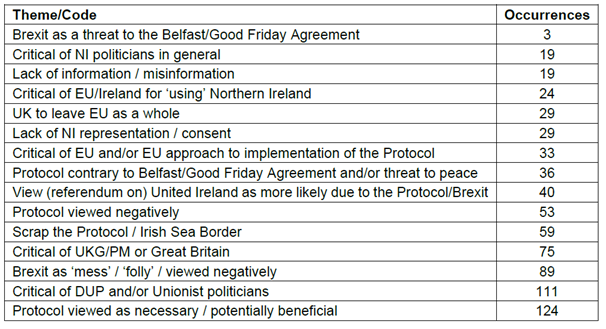Testing the Temperature 1
What do voters in Northern Ireland think about the Protocol on Ireland/Northern Ireland?
Katy Hayward, Billy Melo Araujo, David Phinnemore, Lisa Whitten
The report is available to download here.
April 2021
As part of a three-year ESRC-funded research project on the Protocol on Ireland/Northern Ireland, a series of regular surveys have been commissioned to ‘temperature test’ voter attitudes on a range of issues relating to Brexit, the Protocol, and their implications for Northern Ireland.
The surveys are to be conducted every four months during 2021-2023 by LucidTalk using its online Northern Ireland Opinion Panel.[i] This means that the survey is not based on systematic random sampling across Northern Ireland (NI) society. Instead, it is a reliable indicator of the opinion of NI voters across the spectrum, who take an interest in current affairs and politics, and who are likely to exercise their right to vote. From the sample of 2,156 responses, the results of the first survey presented here are weighted to be representative of the adult population of Northern Ireland (e.g. by age, gender, community background etc.).
The context for this poll
This first survey was undertaken on 24-28 March 2021, so three months into the post-transition period of Brexit. Much has happened in these first three months. Perhaps most significant for the context of this survey, it was conducted after the news that the EU temporarily moved to invoke Article 16 safeguard measures under the Protocol (29 January) and after the Democratic Unionist Party (DUP) launched its five-point ‘Free us from the Protocol’ campaign (2 February). It also came after unilateral UK government decisions on the application of the Protocol (3 March 2021) and, in response, the EU’s decision to launch legal action (15 March 2021). However, the survey was conducted prior to the period of violent protests in Belfast that started on 7 April 2021 and before the informal meeting of the co-chairs of the UK-EU Joint Committee overseeing the Protocol (Lord Frost and Vice-President Šefčovič) (15 April 2021).
Survey participants were asked six sets of questions and offered the opportunity to provide written comments in response to the poll. The questions covered attitudes towards Brexit and the Protocol, assessments of the impact of the Protocol, degrees of concern about related matters, and trust in different actors to manage it. The survey also asked participants how they would like their MLAs to vote in the ‘democratic consent vote’ on the Protocol that will be held by the NI Assembly at the end of 2024.
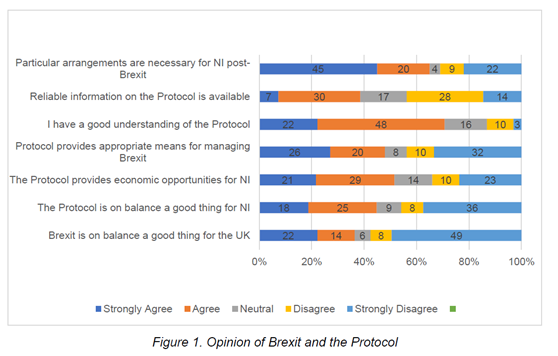
Attitudes to Brexit and the Protocol
Views on the UK’s withdrawal from the EU remain polarised in Northern Ireland. Whilst more than a third of those surveyed think that Brexit is on balance ‘a good thing for the UK’ (37%), a majority (57%) disagree or disagree strongly.
The Protocol on Ireland/Northern Ireland was agreed by the UK and the EU on the grounds that Brexit presented ‘a significant and unique challenge to the island of Ireland’. It seeks to ‘address the unique circumstances on the island of Ireland’ (Article 1(3)). That ‘particular arrangements’ for Northern Ireland are needed to manage the effects of Brexit is a view shared by almost two-thirds (65%) of respondents, with 45% strongly of this view.
Opinion on the Protocol itself, however, is more divided. When asked whether the Protocol ‘provides appropriate means for managing the effects of Brexit on Northern Ireland’, 46% agree that it does and 42% disagree. Similarly, on the matter of whether the Protocol is on balance ‘a good thing’ for Northern Ireland, opinions are even more closely split: overall as many disagree (44%) as agree (43%).
This is despite the fact that a slightly larger proportion of respondents (50%) regard the Protocol as providing economic opportunities for Northern Ireland (whilst one third of respondents disagree). These opinions come against a background of 70% of respondents claiming ‘a good understanding’ of the Protocol, despite the fact that only 37% believe that reliable information on the Protocol is available.
Views on impact of Brexit and the Protocol
Although views on whether the Protocol is ‘on balance a good thing’ are evenly split, a substantial majority of respondents currently view the Protocol to have a negative impact on a range of matters (see Figure 2). No more than a third of respondents see the current impact of the Protocol to be positive in relation to the topics about which we asked. For certain issues – Northern Ireland’s position in the world, north-south cooperation on the island of Ireland, the economy of Northern Ireland, and the 1998 Agreement – respondents’ views of the current impact of the Protocol are less starkly negative.
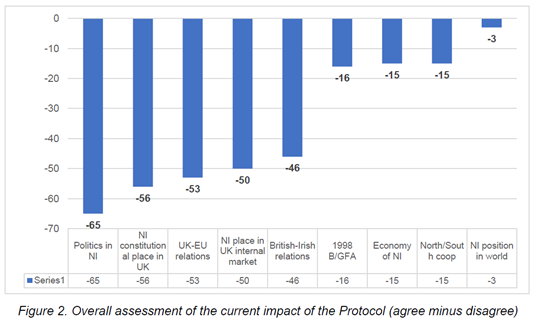
There are particularly strong views among those who want to see the Protocol removed or replaced. Almost half of the respondents who expressed such views in the comments section stated that the EU and/or Irish governments have ‘used’ Northern Ireland to further their own ends. Their concerns are strongly expressed. Some state that the Protocol threatens the future of the peace process and even Northern Ireland. A number of those commenting see the economic, practical, and political implications of the Protocol as intertwined:
“The Protocol is destroying the economy of Northern Ireland, its place in the UK and the fabric of the UK in general.”
“The Protocol is morally reprehensible, an administrative nightmare, and strongly divisive, thus prejudicing political cooperation within Northern Ireland.”
Among the written comments submitted to this survey, characterisations of the Protocol as necessary and/or beneficial occurred most frequently (in fact, twice as often as those criticising it). However, there was variation within this theme. Some respondents believe the Protocol offers “the best of both worlds” and ought to be represented as such. Others believe it could be beneficial if depoliticised and implemented rationally. Another section sees the Protocol as broadly negative but the “least-worst option” which therefore ought to be “made to work”. Many are of the view that Brexit has negative effects:
“Brexit is a disaster and the Protocol, while not perfect, is a necessary mitigation to this.”
“The Protocol is not great but it’s better than no deal and a hard land border.”
A number of respondents point to the possibility of improvement over time:
“This is an evolving situation. If the Protocol is amended to resolve the problems, my [negative] opinion of it will change…”
“The Protocol needs to bed in further, it’s only been 3 months, yes it needs tweaking, but it provides more opportunities for NI than negatives.”
Concerns regarding Brexit and the Protocol
With the UK outside the EU’s customs union and single market since 1 January 2021, and the Protocol in force, the initial months of 2021 have seen various concerns voiced regarding the effects of Brexit and the Protocol. The survey results indicate more than two-thirds of respondents, based on their current experience, being either concerned or very concerned about the effects of Brexit and/or the Protocol on the Northern Ireland economy (71%) on the cost of certain products (71%) and on political stability in Northern Ireland (72%).
A similar proportion of respondents are concerned or very concerned about Northern Ireland’s voice being heard on the implementation of the Protocol (73%), about the public availability of clear and detailed information on the Protocol (69%), and about scrutiny of the UK-EU bodies taking decisions on its implementation (68%).
A majority of respondents are also concerned about the effects of Brexit and the Protocol on the choice of goods available in Northern Ireland (64%) and checks and controls on the movement of goods into Northern Ireland from Great Britain (61%).
Reflecting the general uncertainty around the implications of Brexit and the Protocol, more respondents were concerned overall (47%) than unconcerned (40%) about the consequences for Northern Ireland’s constitutional position in the UK.
Trust to manage the interests of Northern Ireland vis-à-vis the Protocol
The adoption of the Protocol and its implementation involves a range of actors. Trust among survey respondents in the ability of these actors to manage the interests of Northern Ireland in respect of the Protocol is currently low. This is particularly true of UK actors, with overall levels of trust in UK political parties (3%), UK government (5%), and Whitehall civil servants (6%) being strikingly low. Correspondingly, more than four-fifths of respondents report that they distrust/distrust a lot the UK government (86%), UK political parties (84%), and Whitehall civil servants (74%). Negative views of the UK government presented in comments focus on its enacting of a ‘hard’ Brexit and its apparent lack of regard for Northern Ireland in this. Many such views come from unionist/pro-Leave respondents:
“This Protocol and the attitude of the British government to it to me is very disappointing. I’m a Unionist, I’m British not Irish. I don’t want a border down the Irish Sea.”
“The UK government should not have negotiated such a bad deal as it sent the signal that people in Northern Ireland don’t matter and are not being treated like the British citizens that they are…”
The body with formal responsibility for the implementation of the Protocol – the UK-EU Joint Committee – is distrusted by a majority (52%) of respondents but trusted by one-fifth of respondents. The Irish government enjoys slightly more trust (34%) but is distrusted/distrusted a lot on this matter by just under half of respondents (48%).
Northern Ireland political parties, the NI Executive, and the NI Assembly fare marginally better, although even they are distrusted by three-fifths of respondents to manage the interests of Northern Ireland in respect of the Protocol. A similar gap between overall trust and distrust exists for the NI civil service (27% v 41%) and NI civic leaders (28% v 41%). In the comments section of the survey, criticism of the DUP is particularly prevalent.
One group of actors does enjoy comparatively high levels of trust: NI business representatives. They are trusted by 41% of respondents and trusted a lot by a further 11%, with only a quarter expressing distrust of them in managing NI interests.
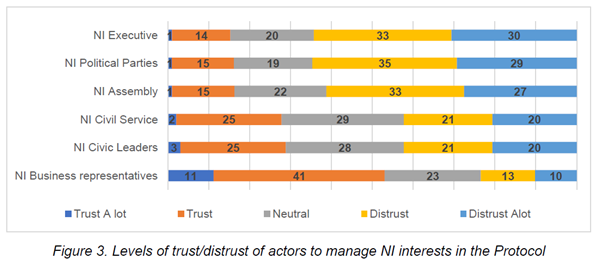
Democratic consent
The future of core provisions of the Protocol – those relating primarily to the movement of goods (i.e. Articles 5-10) – is subject to the democratic consent of the members of the NI Assembly (MLAs) as frequently as every four years. A first vote will take place in November/December 2024.
Most respondents (89%) have a view on how they wish MLAs to vote: 47% in favour of the continued application of Articles 5-10 and 42% against. Most respondents say they will vote in the 2022 Assembly election for candidates who share their view. 42% say they will only vote for candidates in favour of the continued application of Articles 5-10 of the Protocol; 39% say they will only vote for candidates opposed to its continued application. Of those who want their MLAs to oppose the Protocol, two thirds want it removed in its entirety (although this is not possible under the terms of the consent vote).
There is a high level of determination among respondents to use their votes in the 2022 Assembly election to vote for MLAs who share their view on the Protocol. 77% are willing to vote for different candidates to the ones they voted for in 2017 to ensure they vote for candidates who will vote in accordance with their view on the Protocol.
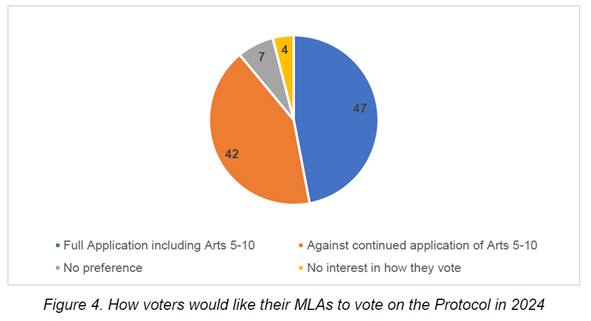
Options for the future
We asked questions regarding the future of the Protocol. The responses to these reveal deep divisions in Northern Ireland on the subject. As noted above, a prominent concern is the extent of the increased formalities, checks and controls on trade between Great Britain and Northern Ireland. One way to reduce these would be for the UK to agree to regulatory alignment with the EU. A majority (57%) of respondents support such a move, although more than a third (34%) oppose such an option. A majority (53%) also exists in support of the EU having an office in Belfast, although a significant minority (40%) opposes such an option.
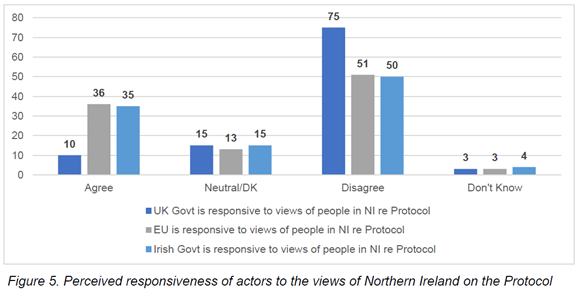
People in Northern Ireland clearly have strongly held views on the Protocol and consider it politically significant. But will their views be heard and addressed? Half of respondents think not in the case of the EU (51%) and the Irish government (50%). The proportion rises to three-quarters (75%) in the case of the UK government.
Also, with respect to the future, a significant number of comments were made in the survey about the possibility of a ‘border poll’. These all assume that Brexit and/or the Protocol make it likely to happen, and to happen more quickly than otherwise. For some, this is a positive thing, but for others it risks political instability.[ii]
Key Findings
- After three months of implementation, the overall assessment of the economic and political impact of the Protocol among NI voters is predominantly negative.
- A clear majority of NI voters, as represented in this survey, have concerns about the current impact of the Protocol across a range of areas.
- Most NI voters (65%) believe that particular arrangements for Northern Ireland are necessary to manage the impact of Brexit, but they are almost evenly split as to whether the Protocol is the appropriate means for this task.
- There are very high levels of distrust of those involved in managing the Protocol in Northern Ireland, most particularly so for the UK government and civil service. The Irish government and the UK-EU Joint Committee also do not have the trust of most NI voters on the Protocol. Relatedly, most believe that these institutions are not responsive to the views of people in Northern Ireland regarding the Protocol.
- NI business representatives are the only actors who enjoy the trust of a majority of voters in Northern Ireland when it comes to managing the Protocol.
- A majority agree that the UK should align more closely with EU rules to reduce formalities, checks and controls on trade between Great Britain and Northern Ireland. A majority also agree there should be an EU office in Belfast. However, there is also a large proportion opposed to both proposals.
- A very slight majority of voters (47%) want to see their MLAs vote in favour of the continued application of the Protocol in the 2024 ‘democratic consent’ vote compared to those who want their MLAs to vote against (42%).
Notes
[i] Polling was carried out by Belfast-based polling and market research company LucidTalk through its online Northern Ireland (NI) Opinion Panel. This panel has over 13,000 members and is regularly polled and surveyed to obtain views and opinions on a range of issues relating to Northern Ireland. This panel is balanced by gender, age-group, area of residence, and community background. A data auditing process was carried out to ensure that all completed poll surveys were genuinely ‘one person, one vote’ returns. The base dataset was then weighted by community and other demographic measurements to reflect the demographic composition of Northern Ireland. All results presented are accurate to a margin of error of +/-2.3% at 95% confidence.
[ii] A summary of the qualitative comments received in the open-text part of the survey:
